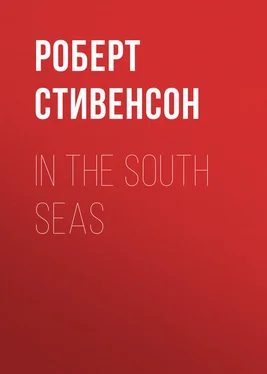Роберт Стивенсон - In the South Seas
Здесь есть возможность читать онлайн «Роберт Стивенсон - In the South Seas» — ознакомительный отрывок электронной книги совершенно бесплатно, а после прочтения отрывка купить полную версию. В некоторых случаях можно слушать аудио, скачать через торрент в формате fb2 и присутствует краткое содержание. Жанр: literature_19, foreign_antique, foreign_prose, Путешествия и география, на английском языке. Описание произведения, (предисловие) а так же отзывы посетителей доступны на портале библиотеки ЛибКат.
- Название:In the South Seas
- Автор:
- Жанр:
- Год:неизвестен
- ISBN:нет данных
- Рейтинг книги:5 / 5. Голосов: 1
-
Избранное:Добавить в избранное
- Отзывы:
-
Ваша оценка:
- 100
- 1
- 2
- 3
- 4
- 5
In the South Seas: краткое содержание, описание и аннотация
Предлагаем к чтению аннотацию, описание, краткое содержание или предисловие (зависит от того, что написал сам автор книги «In the South Seas»). Если вы не нашли необходимую информацию о книге — напишите в комментариях, мы постараемся отыскать её.
In the South Seas — читать онлайн ознакомительный отрывок
Ниже представлен текст книги, разбитый по страницам. Система сохранения места последней прочитанной страницы, позволяет с удобством читать онлайн бесплатно книгу «In the South Seas», без необходимости каждый раз заново искать на чём Вы остановились. Поставьте закладку, и сможете в любой момент перейти на страницу, на которой закончили чтение.
Интервал:
Закладка:
Here, then, we have one side of the case. Man-eating among kindly men, child-murder among child-lovers, industry in a race the most idle, invention in a race the least progressive, this grim, pagan salvation-army of the brotherhood of Oro, the report of early voyagers, the widespread vestiges of former habitation, and the universal tradition of the islands, all point to the same fact of former crowding and alarm. And to-day we are face to face with the reverse. To-day in the Marquesas, in the Eight Islands of Hawaii, in Mangareva, in Easter Island, we find the same race perishing like flies. Why this change? Or, grant that the coming of the whites, the change of habits, and the introduction of new maladies and vices, fully explain the depopulation, why is that depopulation not universal? The population of Tahiti, after a period of alarming decrease, has again become stationary. I hear of a similar result among some Maori tribes; in many of the Paumotus a slight increase is to be observed; and the Samoans are to-day as healthy and at least as fruitful as before the change. Grant that the Tahitians, the Maoris, and the Paumotuans have become inured to the new conditions; and what are we to make of the Samoans, who have never suffered?
Those who are acquainted only with a single group are apt to be ready with solutions. Thus I have heard the mortality of the Maoris attributed to their change of residence – from fortified hill-tops to the low, marshy vicinity of their plantations. How plausible! And yet the Marquesans are dying out in the same houses where their fathers multiplied. Or take opium. The Marquesas and Hawaii are the two groups the most infected with this vice; the population of the one is the most civilised, that of the other by far the most barbarous, of Polynesians; and they are two of those that perish the most rapidly. Here is a strong case against opium. But let us take unchastity, and we shall find the Marquesas and Hawaii figuring again upon another count. Thus, Samoans are the most chaste of Polynesians, and they are to this day entirely fertile; Marquesans are the most debauched: we have seen how they are perishing; Hawaiians are notoriously lax, and they begin to be dotted among deserts. So here is a case stronger still against unchastity; and here also we have a correction to apply. Whatever the virtues of the Tahitian, neither friend nor enemy dares call him chaste; and yet he seems to have outlived the time of danger. One last example: syphilis has been plausibly credited with much of the sterility. But the Samoans are, by all accounts, as fruitful as at first; by some accounts more so; and it is not seriously to be argued that the Samoans have escaped syphilis.
These examples show how dangerous it is to reason from any particular cause, or even from many in a single group. I have in my eye an able and amiable pamphlet by the Rev. S. E. Bishop: ‘Why are the Hawaiians Dying Out?’ Any one interested in the subject ought to read this tract, which contains real information; and yet Mr. Bishop’s views would have been changed by an acquaintance with other groups. Samoa is, for the moment, the main and the most instructive exception to the rule. The people are the most chaste and one of the most temperate of island peoples. They have never been tried and depressed with any grave pestilence. Their clothing has scarce been tampered with; at the simple and becoming tabard of the girls, Tartuffe, in many another island, would have cried out; for the cool, healthy, and modest lava-lava or kilt, Tartuffe has managed in many another island to substitute stifling and inconvenient trousers. Lastly, and perhaps chiefly, so far from their amusements having been curtailed, I think they have been, upon the whole, extended. The Polynesian falls easily into despondency: bereavement, disappointment, the fear of novel visitations, the decay or proscription of ancient pleasures, easily incline him to be sad; and sadness detaches him from life. The melancholy of the Hawaiian and the emptiness of his new life are striking; and the remark is yet more apposite to the Marquesas. In Samoa, on the other hand, perpetual song and dance, perpetual games, journeys, and pleasures, make an animated and a smiling picture of the island life. And the Samoans are to-day the gayest and the best entertained inhabitants of our planet. The importance of this can scarcely be exaggerated. In a climate and upon a soil where a livelihood can be had for the stooping, entertainment is a prime necessity. It is otherwise with us, where life presents us with a daily problem, and there is a serious interest, and some of the heat of conflict, in the mere continuing to be. So, in certain atolls, where there is no great gaiety, but man must bestir himself with some vigour for his daily bread, public health and the population are maintained; but in the lotos islands, with the decay of pleasures, life itself decays. It is from this point of view that we may instance, among other causes of depression, the decay of war. We have been so long used in Europe to that dreary business of war on the great scale, trailing epidemics and leaving pestilential corpses in its train, that we have almost forgotten its original, the most healthful, if not the most humane, of all field sports – hedge-warfare. From this, as well as from the rest of his amusements and interests, the islander, upon a hundred islands, has been recently cut off. And to this, as well as to so many others, the Samoan still makes good a special title.
Upon the whole, the problem seems to me to stand thus: – Where there have been fewest changes, important or unimportant, salutary or hurtful, there the race survives. Where there have been most, important or unimportant, salutary or hurtful, there it perishes. Each change, however small, augments the sum of new conditions to which the race has to become inured. There may seem, a priori , no comparison between the change from ‘sour toddy’ to bad gin, and that from the island kilt to a pair of European trousers. Yet I am far from persuaded that the one is any more hurtful than the other; and the unaccustomed race will sometimes die of pin-pricks. We are here face to face with one of the difficulties of the missionary. In Polynesian islands he easily obtains pre-eminent authority; the king becomes his mairedupalais ; he can proscribe, he can command; and the temptation is ever towards too much. Thus (by all accounts) the Catholics in Mangareva, and thus (to my own knowledge) the Protestants in Hawaii, have rendered life in a more or less degree unliveable to their converts. And the mild, uncomplaining creatures (like children in a prison) yawn and await death. It is easy to blame the missionary. But it is his business to make changes. It is surely his business, for example, to prevent war; and yet I have instanced war itself as one of the elements of health. On the other hand, it were, perhaps, easy for the missionary to proceed more gently, and to regard every change as an affair of weight. I take the average missionary; I am sure I do him no more than justice when I suppose that he would hesitate to bombard a village, even in order to convert an archipelago. Experience begins to show us (at least in Polynesian islands) that change of habit is bloodier than a bombardment.
There is one point, ere I have done, where I may go to meet criticism. I have said nothing of faulty hygiene, bathing during fevers, mistaken treatment of children, native doctoring, or abortion – all causes frequently adduced. And I have said nothing of them because they are conditions common to both epochs, and even more efficient in the past than in the present. Was it not the same with unchastity, it may be asked? Was not the Polynesian always unchaste? Doubtless he was so always: doubtless he is more so since the coming of his remarkably chaste visitors from Europe. Take the Hawaiian account of Cook: I have no doubt it is entirely fair. Take Krusenstern’s candid, almost innocent, description of a Russian man-of-war at the Marquesas; consider the disgraceful history of missions in Hawaii itself, where (in the war of lust) the American missionaries were once shelled by an English adventurer, and once raided and mishandled by the crew of an American warship; add the practice of whaling fleets to call at the Marquesas, and carry off a complement of women for the cruise; consider, besides, how the whites were at first regarded in the light of demi-gods, as appears plainly in the reception of Cook upon Hawaii; and again, in the story of the discovery of Tutuila, when the really decent women of Samoa prostituted themselves in public to the French; and bear in mind how it was the custom of the adventurers, and we may almost say the business of the missionaries, to deride and infract even the most salutary tapus. Here we see every engine of dissolution directed at once against a virtue never and nowhere very strong or popular; and the result, even in the most degraded islands, has been further degradation. Mr. Lawes, the missionary of Savage Island, told me the standard of female chastity had declined there since the coming of the whites. In heathen time, if a girl gave birth to a bastard, her father or brother would dash the infant down the cliffs; and to-day the scandal would be small. Or take the Marquesas. Stanislao Moanatini told me that in his own recollection, the young were strictly guarded; they were not suffered so much as to look upon one another in the street, but passed (so my informant put it) like dogs; and the other day the whole school-children of Nuka-hiva and Ua-pu escaped in a body to the woods, and lived there for a fortnight in promiscuous liberty. Readers of travels may perhaps exclaim at my authority, and declare themselves better informed. I should prefer the statement of an intelligent native like Stanislao (even if it stood alone, which it is far from doing) to the report of the most honest traveller. A ship of war comes to a haven, anchors, lands a party, receives and returns a visit, and the captain writes a chapter on the manners of the island. It is not considered what class is mostly seen. Yet we should not be pleased if a Lascar foremast hand were to judge England by the ladies who parade Ratcliffe Highway, and the gentlemen who share with them their hire. Stanislao’s opinion of a decay of virtue even in these unvirtuous islands has been supported to me by others; his very example, the progress of dissolution amongst the young, is adduced by Mr. Bishop in Hawaii. And so far as Marquesans are concerned, we might have hazarded a guess of some decline in manners. I do not think that any race could ever have prospered or multiplied with such as now obtain; I am sure they would have been never at the pains to count paternal kinship. It is not possible to give details; suffice it that their manners appear to be imitated from the dreams of ignorant and vicious children, and their debauches persevered in until energy, reason, and almost life itself are in abeyance.
Читать дальшеИнтервал:
Закладка:
Похожие книги на «In the South Seas»
Представляем Вашему вниманию похожие книги на «In the South Seas» списком для выбора. Мы отобрали схожую по названию и смыслу литературу в надежде предоставить читателям больше вариантов отыскать новые, интересные, ещё непрочитанные произведения.
Обсуждение, отзывы о книге «In the South Seas» и просто собственные мнения читателей. Оставьте ваши комментарии, напишите, что Вы думаете о произведении, его смысле или главных героях. Укажите что конкретно понравилось, а что нет, и почему Вы так считаете.












